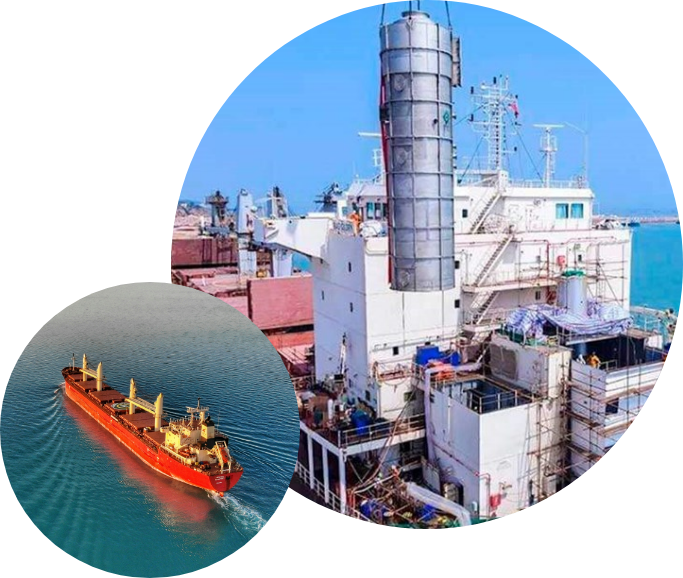What Are Scrubbers?
Scrubbers are systems installed on ships to reduce sulfur emissions by “scrubbing” exhaust gases. They allow ships to comply with emission regulations while continuing to burn high-sulfur fuel.
How Do Scrubbers Work?
Scrubbers utilize water to remove pollutants from exhaust gases. The resulting polluted water, known as scrubber discharge, is released directly into the ocean.

Toxic Fallout:
How Scrubbers Pollute Our Oceans

Heavy Metals & Toxins: Mercury, lead, and other bioaccumulative toxins harm marine life and human food sources.

Harm to Marine Species: From plankton to whales, scrubber discharge affects the entire ocean food chain.

Ocean Acidification: Scrubber discharge lowers pH, damaging coral reefs and shellfish populations.
A Loophole That Fuels Pollution
International regulations allow ships to continue burning cheap, high-sulfur fuels as long as they use scrubbers. This loophole undermines the original intent of emission regulations and shifts pollution from the air to our oceans.
65%
of ships follow best practices by using cleaner fuels instead of relying on scrubbers.
Sign our Petition to Stop Scrubber Fleets
Case Studies
While scrubbers clean the air, they poison our oceans. Learn how shipping companies exploit loopholes, putting profits over the environment.
Baltic Sea Case Study
A study published in Nature Sustainability examined the economic and environmental impacts of scrubber use in the Baltic Sea. The findings revealed that the adoption of scrubbers has led to a significant increase in heavy metal pollution, resulting in millions of dollars in environmental damage.
Contaminants in Aquatic and Terrestrial Environments
A study published in Environmental Science & Technology examined the impact of exhaust gas scrubber effluents from ships on the marine copepod Calanus helgolandicus.
Take Action
Charterers MUST Stop Hiring Scrubber Fleets and Protect Our Oceans
No one has the right to destroy our oceans. It’s time to close the scrubber loophole and protect our oceans.
Charterers MUST Stop Hiring Scrubber Fleets and Protect Our Oceans
No one has the right to destroy our oceans. It’s time to close the scrubber loophole and protect our oceans.
News & Resources
Environmental Groups Call for Scrubber Ban Ahead of OSPAR Ministerial Meeting in Vigo
Ahead of the OSPAR Ministerial Meeting in Vigo on 26 June, Seas At Risk and 19 other organisations (and counting) are urging OSPAR Environment Ministers to ban toxic wastewater discharge from scrubbers — a method used by ships to clean their exhaust gases.
Ireland Considers OSPAR Rules to Regulate Ship Scrubbers
The Department of Transport has issued Marine Notice No. 34 of 2025, alerting shipowners, fishing vessel operators, and other maritime stakeholders to upcoming proposals under the OSPAR Convention aimed at regulating discharge water from Exhaust Gas Cleaning Systems (EGCS), commonly known as scrubbers, on ships operating in the North-East Atlantic.
Cruise ships urged to ‘clean up their act’ amid concerns toxic effluent being dumped on Great Barrier Reef
Environmentalists say marine park waste regulations need updating to limit grey water and exhaust chemicals as passenger cruise numbers rise
Contact Us
"*" indicates required fields